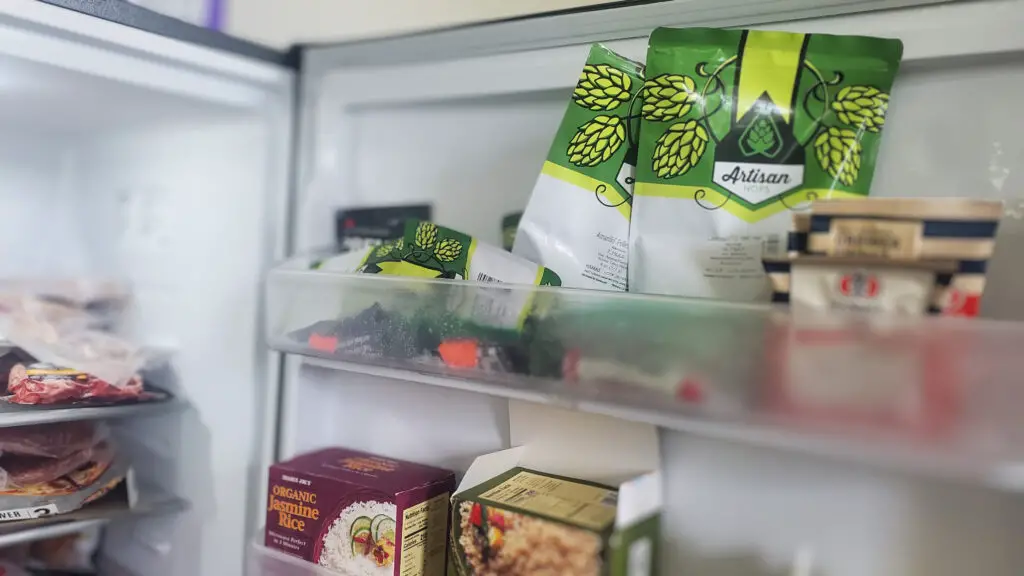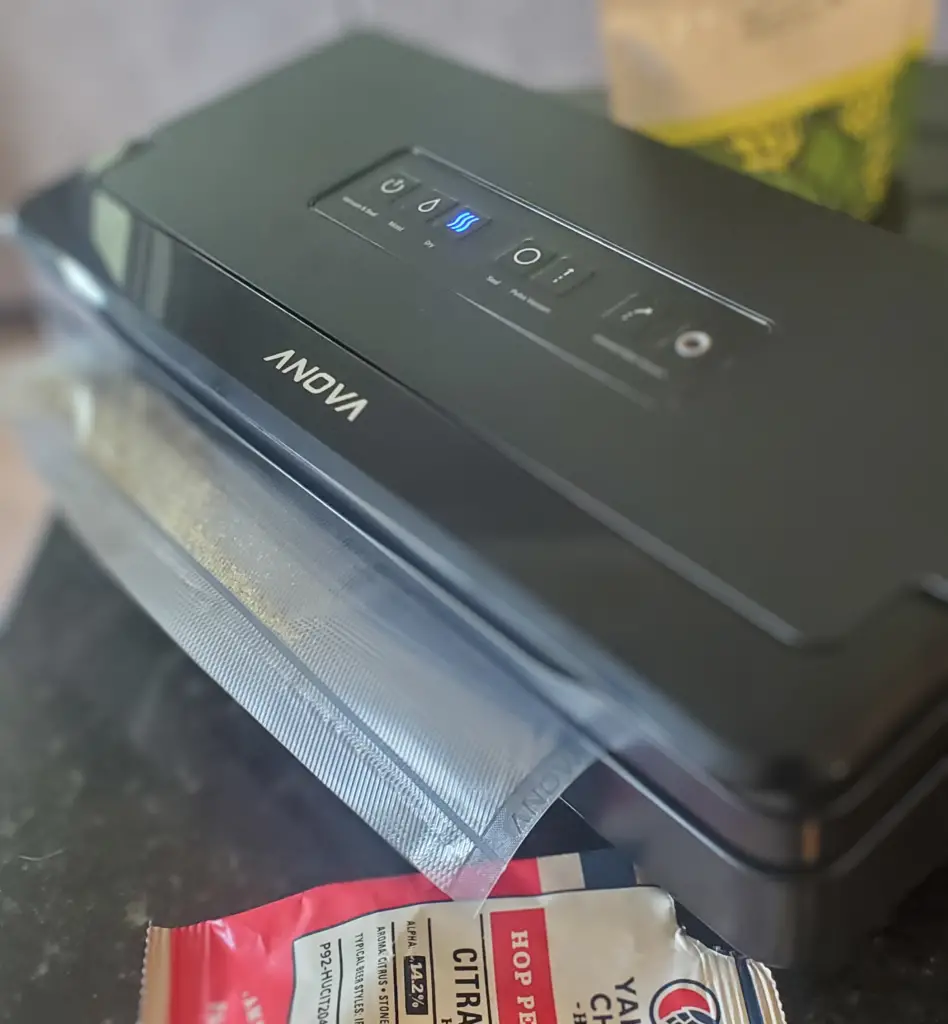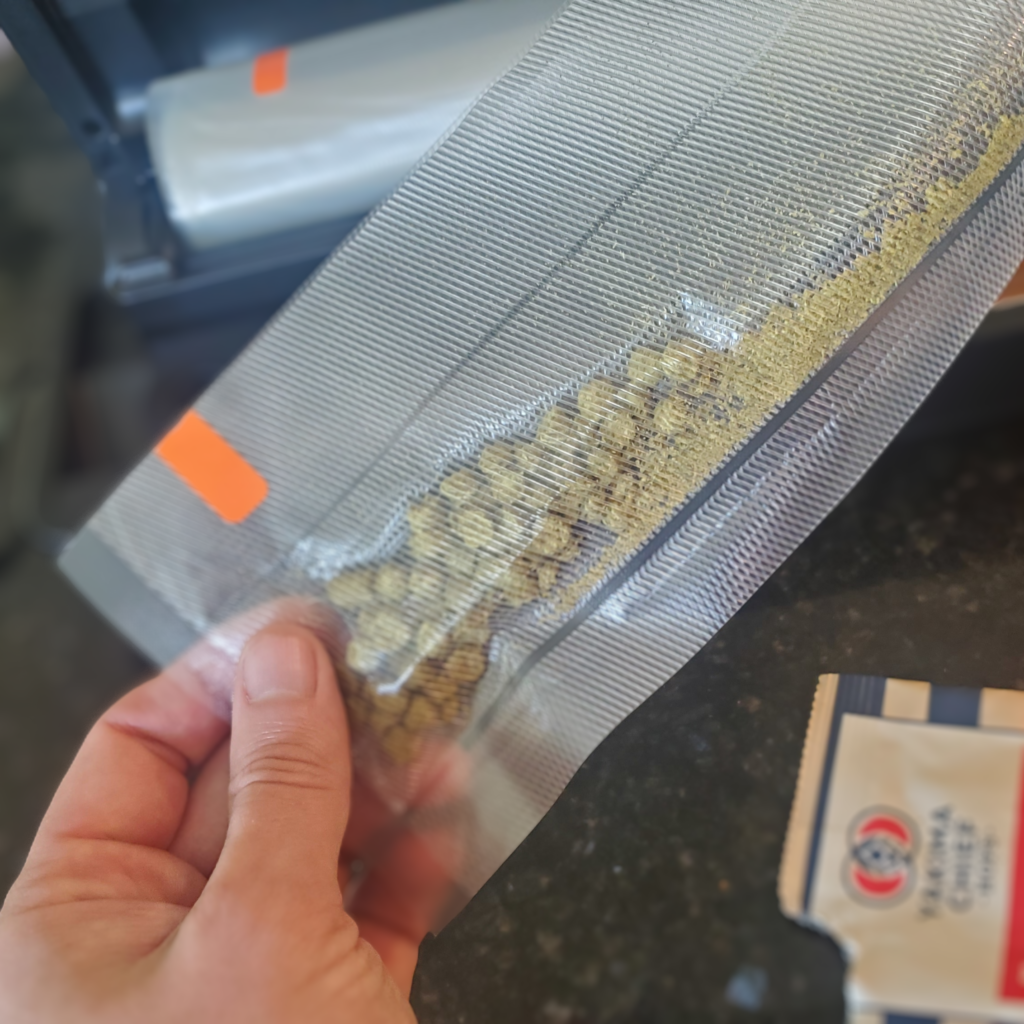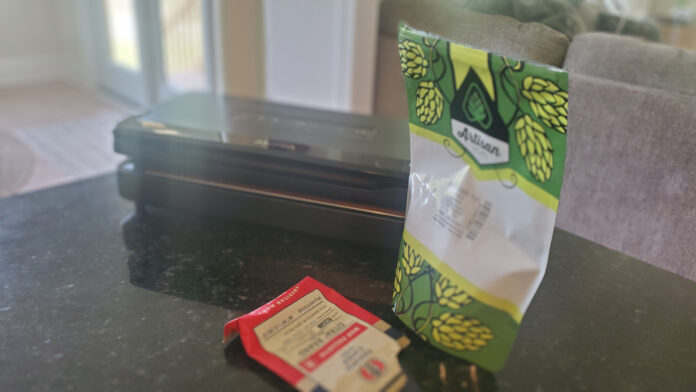I have previously written about long-term storage of bulk grain as well as reusing yeast, but what about hops? I did some research to figure out the optimal way to store hops and, surprisingly, I found that I’ve been doing it all along!
You should store your hops in your freezer, vacuum-sealed, at the coldest temperature possible: around 0°F is acceptable. Stored like this, your hops will stay fresh for two to four years, and degradation will slow down dramatically, keeping the hops usable for several years beyond that.
While it may take a bit more effort to properly store hops, buying hops in bulk is by far the best way to save money per batch or bottle of beer.
It may only take a few ounces of hops for even the hoppiest of beers, but buying by the ounce is fairly pricey. However, buying more than you need can get a discount – and even several pounds of hops doesn’t take up very much space!
But how do you store that much in hops?
Surprisingly, it’s not that bad! By simply freezing your hops (and doing nothing else) you can ensure that they’ll last for several months – plenty of time to brew a few batches and use up a decent amount!
And if you’re willing to spend a bit of money and get a vacuum sealer? Well, vacuum sealed hops, stored in the freezer, can last years without degrading!
While the hops will still ultimately degrade slowly over time, some brewers have noted that their hops, vacuum sealed and frozen, are still aromatic and flavorful seven years later!
Note that the information in this article largely relates to pellet hops. While the advice does apply, to an extent, to dried whole hops (and even hops fresh from the bine!), they don’t last quite as long – pellet hops are much more stable than whole hops, and degrade much more slowly.
(For more information about pellet hops vs. whole hops, check out this article I wrote previously!)
So you might find that, while vacuum sealing and/or freezing your hope cones will definitely extend their useful life, it’s not going to be quite as long as the number of months or years I’m describing.
There are a few considerations when it comes to storing hops:
- Oxygen. Consider the fact that the hoppiest beers, such as a hazy NEIPA, are the hardest to keep from getting oxidized. This is due to the hops. Oxidation of the alpha and beta acids in hops can, at best, lead to reduced flavor and aroma – and at worst, result in a “cheesy” flavor as your hops age.
- Heat. Temperature influences the oxidation effect on hops. The warmer the temperature, the faster your hops will become oxidized and flavor will degrade – and vice versa.
- Sunlight. UV rays cause sunstrickenness in your brew – and can do it to the hops before they even end up in a beer! Note that this only results from UV light – the lights in your kitchen or inside your refrigerator are unlikely to cause any damage to your hops.
Freezing Your Hops
Even if you don’t have the option to vacuum seal your hops and outright prevent oxidation, you can slow it down drastically by keeping your hops cold. The colder the better! And fortunately, this takes no extra effort or special equipment – assuming you have a refrigerator/freezer already for food!
Keeping your hops frozen, close to 0°F in your freezer, will keep them fresher, longer. Even if you do not own a vacuum sealer, storing your hops in their original package in your freezer can slow degradation and extend their useful life by 6 to 12 months.
Homebrewers often seem to think that you have to use up all of the hops you purchase immediately, and that they will quickly degrade and lose their flavor once the package is opened.
But that’s not really the case!
Ever since the beginning, I’ve always purchased more hops than I need with each order. My recipes often call for odd amounts – a few different hops at 14 gram additions each, for example – and you typically have to buy your hops by the whole ounce at the very least. So I’ve long been forced to keep my extra hops in the freezer for later use, even before I owned a vacuum sealer.

And while the flavor and aromatics do degrade over time (a beer made a few weeks later will have a less-hoppy flavor), I find that they’re still useful – and in most cases, I use up what I buy before they’re no longer any good.
Obviously, this won’t work if you want to buy in bulk! A few pounds of a given hop is going to last a while – unless you’re brewing often and you only ever use a few different hop strains.
But simply closing up the package and popping it in the freezer after a brew day will ensure your hops stay usable for 6 to 12 months.
Vacuum Sealing Your Hops
By getting yourself a vacuum sealer, you can take the next step and keep your hops fresh for what feels like forever.
Oxidation is the primary culprit for the degradation of your hops – heat just speeds that process up.
And you can mostly mitigate this by keeping your hops stored in a vacuum-sealed bag. The home vacuum sealer isn’t perfect, and can’t remove all of the air in the bag, but it does a pretty good job!

If vacuum-sealed, your hops can last for years. It’s often stated that, even after two to four years of vacuum-sealed (and frozen) storage, your hops will likely produce a beer that won’t be noticeably different.
And some homebrewers have stored theirs even longer – up to seven years – and still found that they can be used to make a delicious beer!
Vacuum sealers are not particularly expensive. I’m particularly fond of my Anova vacuum sealer, which was purchased on Amazon for only around $150. While this may seem steep just for hop storage (and you’d have to buy a lot of hops to save enough to make up for that price) you should also realize that a vacuum sealer is useful for so many other things than just hop storage!
You can use a vacuum sealer to buy pretty much everything in bulk and store it indefinitely. My household has half of our deep freeze reserved for various meats purchased at Costco, plus quite a bit of venison, and a lot of fresh fruit and vegetables from my mother-in-law’s garden. I also use it to cook with my sous vide.
And for storing hops!
How to Reuse Vacuum Sealer Bags for Optimal Savings
My biggest concern when starting to vacuum-seal my hops was the bags.
While they aren’t particularly expensive, if you are brewing often, you may find yourself opening up the vacuum sealer bags containing your hops a lot, and if you’re resealing in new bags each time, you’re probably spending too much money just on those bags and really cutting into your savings!
Vacuum sealer bags can be reused for storage with some forethought. If you intend to open and reseal your bags multiple times, be sure to start with a larger bag than you otherwise need. When you open the bag, cut as close to the seal as possible to remove as little as you can; then, when resealing, do so close to the edge of the bag.

Doing this often can still be a little wasteful – you’re using more bag than you initially need, and you’re going to have to throw away the bag’s seal each time – but over time it will allow you to save and reuse the majority of the bag.
That’s much better than throwing away the whole bag and getting a new one every time you need to get some hops for a brew day!
If you buy your hops in bulk and store them with this method, you should be able to get many uses out of a single (albeit slightly larger) vacuum sealer bag.
Optional: Purging With CO2 Before Sealing
To really step up your bulk hop storage game and all but stop the degradation of your hops, you can also purge the bag with CO2 (or some other dense, inert gas) before vacuum-sealing it.
Presumably, this will keep your hops fresh for basically forever.
The vacuum sealer cannot suck out all of the air. It does a pretty good job, but unfortunately, it traps a little bit in the gaps between the hops once the bag is sealed.
However, by purging the bag with CO2, much like you might purge a keg before filling it with beer, you can use pressure to push all of the oxygen out (and replace it with a less-damaging gas) first.
Full disclosure: I’ve never done this, nor have I ever actually known anyone who has. It came up while I was doing research on the subject. I know that this is how hops are stored and shipped by the manufacturer – that’s why hops don’t need to be shipped under ice, and why it’s relatively safe to keep them at room temperature until you first open the package.
I don’t know if I’ll be taking the extra steps to do this myself – getting several years out of a purchase without doing so is probably enough – but I figured it’s important to be thorough and provide as much information as I can!
Buying Your Hops in Bulk
So now that you know how to store the hops once you have them, how do you actually buy them in bulk?
Bulk volumes of the hops you’re already buying can probably be bought wherever you’re already buying them. Usually, a shop will provide a discount for buying in larger volume.
MoreBeer.com – my go-to for brewing ingredients – will allow you to buy up to 11 lb. of a given hop at a time. I think this is probably enough for most – but there are other options if you need even more than that!
Buying 1 oz each of a few different hop varieties for a single batch is the least cost-efficient way to make beer!
I haven’t truly begun bulk-ordering my hops, even though I have everything I need to do so – but I’ve been following these steps for a while now and always buying more hops than I need.
And that’s how you do it: just buy more than you need! If you find yourself brewing with Amarillo quite often, as I do, then next time you hop on to purchase some for a recipe, buy a few pounds for storage instead of the few ounces you may need for that specific recipe!
Don’t go way overboard with hops you don’t use often or have never tried, though. It can be mildly annoying to have a big bag of an odd hop strain that you don’t like and know you’ll never use again.
Or do go overboard if you want, I guess. Stored right, that hop will last for years until you can find a reason to use it again.
Conclusion
By far the best way to save money on each batch of brew is to buy your hops in bulk.
And storing even a large amount of hops really isn’t that difficult or expensive!
All you really need is a freezer and a vacuum sealer.
I’ve been storing my hops like that for years already – I think it’s time I started making larger purchases!



